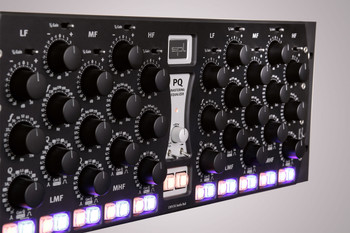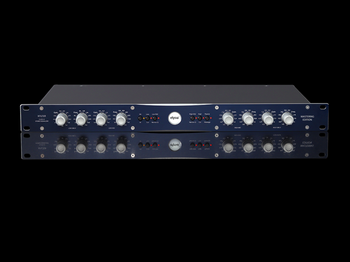Description
The new dual-channel PASSEQ (Model 1650/1654) is the resolute evolution of the highly acclaimed predecessor Model 2595.
The new PASSEQ now features Air band, a stepped output control ranging from -10dB to +10dB and a mid cut band now starting at 200Hz. These features were on the wish list of many mastering engineers.
Furthermore we have exchanged capacitor arrays in the filters by custom-made single capacitors and optimized the bandwidth per frequency range. This evolution is a sonic revolution.
Powerful Passive EQ
The first generation Passeq was the first passive equalizer that offered high, mid and low band with individual boost and cut and with 12 selectable frequencies per band. Passeq was the most powerful passive EQ system ever made with a total of 36 boost and 36 cut frequencies. The sheer amount of possible frequency curves or shapes is close to 3 million.
Now, here is the 2nd generation: the new PASSEQ Mastering Equalizer. It features the same amount of boost and cut frequencies, though the choice of frequencies is altered and the Q-factor is more musically adjusted for each selectable frequency.
The Sound of Passive
The components in a passive filter such a variable resistor, capacitor and coil deliver a special sonic character. An important part of the sound is played by coil and capacitor loading and saturation characteristics. The resulting inertia in contrast to the fast reaction of active filters is the reason for the pleasing sound that we get from passive designs.
We tend to perceive these attributes in terms of an increased suppleness and transparency, with perceptibly improved, silky highs and warm and punchy basses.
Q
Each boost and cut frequency now got an individual optimized Q factor. Especially the mid bands are more harmonious for working on program material. When we were fine-tuning, through component selection, within countless listening sessions, the focus was on receiving musically sounding curves, which are clearly on par with legendary devices like the Pulteq EQ from the decades of the 1950s and 60s, but without all disadvantages of a 60-year-old original, like a high noise level and most of all a very limited choice of frequencies.
Mid Range Cut
The Mid Range Cut band is expanded to lower frequencies and now starts at 200Hz already. This was a request from many mastering engineers and to achieve this we got bigger coils custom-made.
Air Band
Another highlight of the new PASSEQ is the HF+ Band, which is expanded upwards with the frequencies: 25kHz and 35kHz. They lift the ceiling in any recording and sound incredibly good, open, wide and natural.
Output
Thanks to the big detended output control, you can increase or attenuate the output level by 10dB, to drive the following devices with the perfect desired level.
This is important especially in mastering. This feature was on the wishlist of many mastering engineers for a new version of the Passeq.
Easy Recall
Boost/Cut, Q (HF +) and Output are adjusted with stepped potentiometers (ALPS RK27 "big blue") with 41 detentions. All frequencies are set with 12-position switches. Thanks to these switches and detented potentiometers a precise recall is very easy to do.
Auto Bypass & Interval
Like all new SPL Mastering devices, the PASSEQ features Auto Bypass. Of course each of the two channels can be manually activated and deactivated with big illuminated pushbuttons, but thanks to Auto Bypass switching is done by the PASSEQ to let you focus on the sonic comparison solely while your judgment is not compromized by the act of switching. The Interval control sets the switching period.
Specifications
Inputs
Max. Input Level: + 32.5 dBu
Input Inpedance: 20 kOhms (balanced)
Outputs
Max. Output Level: + 32.5 dBu
Output Inpedance: ‹ 600 Ohms (balanced)
Harmonic Distortion:
at -30 dBu: 0.076%
at -20 dBu: 0.026%
at 0 dBu: 0.026%
at +10 dBu: 0.0086%
at +30 dBu: 0.0012%
Noise (unweighted, (Gain +0 dBu, EQ = 0dB B/C): - 91.8 dBu
Noise (A-weighted, (Gain +0 dBu, EQ = 0dB B/C): - 95.2 dBu
Noise CCIR, (Gain +0 dBu, EQ = 0dB B/C): -86.2 dBu
THD & N (Gain +0 dBu, EQ = 0dB B/C): › 102 dB
Common-Mode-Rejection: › -60 dBu (bei 1 kHz, Gain +0 dBu, EQ = 0dB B/C)
Transmission Bandwidth (-3 dB): 10 Hz - 200 kHz
Frequency Range: 10 Hz - 35 kHz
Power Consumption: 0.06 Amp, 230V/50Hz, 9.5 Watt, 13.6 VA; 0.09 Amp, 115V/60Hz, 9.5 Watt, 13.6 VA
Fuses: 230 V/50 Hz: 0.5 Amp; 115 V/60 Hz: 1 Amp
Dimensions: Standard EIA 19 Inch Housing/4U, 482 x 177 x 311.5 mm / ca. 19" x 7" x 12,25"
Weight: 10.2 kg / 22.5 lb












